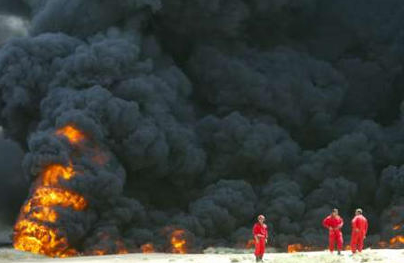
Incident Report
Subject: Oil prices surge on sabotage near Basra Date of Email reporting Incident: Fri 28/03/2008 Report Detail:
In this image of armed men are seen Wednesday, March 26, 2008, in Basra, Iraq. Iraq's prime minister on Wednesday gave gunmen in the southern oil port of Basra three days to surrender their weapons and renounce violence as clashes between security forces and Shiite militia fighters erupted for a second day./Oil refinery, Basra, Iraq Oil rose above $106 a barrel on Thursday after saboteurs blew up a major pipeline in Iraq, cutting exports from the south of the country, and also because of strength in heating-oil futures. The attack on the pipeline in southern Iraq came on the third day of an Iraqi military operation against fighters loyal to Shiite cleric Moqtada al-Sadr in the oil port of Basra. "Today's action was driven up by the explosion and catching fire of a pipeline in Iraq," said Nauman Barakat, oil trader and senior vice president at Macquarie Futures USA. US crude was up $1.05 to $106.95 a barrel by 1630 GMT, having earlier risen as high as $107.70. London Brent crude added $0.56 to $104.55. Crude was also pulled up by heating oil, which rose almost 2 percent. Traders said a force majeure declaration by South Korean refiner S-Oil for April loadings of oil products had in part prompted the gain. In Iraq, officials said that efforts were under way to get shipments back to normal. It is the first time since 2004 that the southern supply route has been disrupted. Iraq exported about 1.54 million barrels per day from Basra in February. Overall Iraqi oil exports have only recently returned to a rate similar to that before the US-led invasion. Officials in Basra had different views about how long it would take to restore supplies and the seriousness of the attack. Oil's move up followed a jump of almost $5 on Wednesday prompted by a drop in fuel inventories in top consumer the US and as a weak dollar prompted investors to move money back into commodities. Global supplies are being further pressured by the Organization of 'Oil Producing Countries' (OPEC] decision to maintain its output levels earlier this month. Oil prices have also been supported by long-term concerns over the ability of producers to meet rising energy demand from the developing world, notably China and India. "Many are using commodities to hedge themselves against much-feared inflation," said Sucden analyst Andrey Kryuchenkov. New York crude hit a record intraday high of $111.80 on March 17, while London Brent scored a historic peak of $108.02 earlier this month. Gasoline stocks fell by a larger-than-expected 3.3 million barrels and distillates dropped 2.2 million barrels, also more than forecast, the Energy Information Administration said. Analysts say the weakening dollar has prompted investors to buy oil and other commodities as a hedge against inflation, while dollar strength can lower demand for commodities. Exacerbating the impact of foreign exchange moves, oil futures are priced in dollars, making them more expensive to investors overseas when the 'greenback' rises. Thursday's supply concerns temporarily drew investors' attention from the dollar, which rose slightly against the euro, reversing the trend that had partly sent oil futures surging on Wednesday. |


